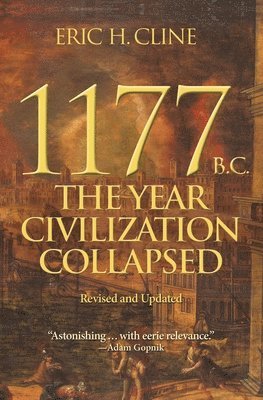
- Format
- Häftad (Paperback / softback)
- Språk
- Engelska
- Antal sidor
- 304
- Utgivningsdatum
- 2021-02-02
- Förlag
- Princeton University Press
- Illustratör/Fotograf
- 10 b, 2 maps w illus 2 tables
- Illustrationer
- 10 halftones. 2 maps.
- Dimensioner
- 204 x 133 x 20 mm
- Vikt
- Antal komponenter
- 1
- ISBN
- 9780691208015
- 272 g
1177 B.C.
The Year Civilization Collapsed: Revised and Updated
- Skickas från oss inom 5-8 vardagar.
- Fri frakt över 249 kr för privatkunder i Sverige.
Passar bra ihop
De som köpt den här boken har ofta också köpt Discourses and Selected Writings av Epictetus, Robert Dobbin (häftad).
Köp båda 2 för 372 krKundrecensioner
Fler böcker av Eric H Cline
-
Ancient Empires
Eric H Cline
-
The Trojan War
Eric H Cline
-
Biblical Archaeology
Eric H Cline
-
Student Study Guide to The Ancient Egyptian World
Eric H Cline
Recensioner i media
"The memorable thing about Cline's book is the strangely recognizable picture he paints of this very faraway time. . . . It was as globalized and cosmopolitan a time as any on record, albeit within a much smaller cosmos. The degree of interpenetration and of cultural sharing is astonishing."---Adam Gopnik, New Yorker "[1177 B.C.] has been recommended to me by so many people over the years. I finally read it. Its fantastic."---Matthew Yglesias, New York Times "A fascinating look at the Late Bronze Age, proving that whether for culture, war, economic fluctuations or grappling with technological advancement, the conundrums we face are never new, but merely renewed for a modern age."---Larry Getlen, New York Post "Cline has created an excellent, concise survey of the major players of the time, the latest archaeological developments, and the major arguments, including his own theories, regarding the nature of the collapse that fundamentally altered the area around the Mediterranean and the Near East."---Evan M. Anderson, Library Journal "A remarkable book that brings forth not just a piece of history, but also lessons from the past."---Mihai Andrei, ZME Science "Fresh and engaging."---Andrew Robinson, Current World Archaeology "The 12th century BCE is one of the watershed eras of world history. Empires and kingdoms that had dominated late Bronze Age western Asia and the eastern Mediterranean collapsed." * Choice * "Cline explores a vast array of variables that could have led to the disruption of the society of this era, including earthquakes, famines, droughts, warfare, and, most notably, invasions by the 'Sea Peoples.'" * Publishers Weekly * "A detailed but accessible synthesis. . . . [O]ffers students and the interested lay antiquarian a sense of the rich picture that is emerging from debates among the ruins."---Scott McLemee, Inside Higher Ed "In this enjoyable new book, Eric H. Cline has set himself an ambitious task: Not only must he educate a popular audience about the wealth and power of the eastern Mediterranean civilizations of the Bronze Age, he must then make his readers care that, some time around the year 1200 B.C., these empires, kingdoms, and cities suffered a series of cataclysms from which they never recovered."---Susan Kristol, Weekly Standard "[An] engaging book. . . . Cline builds a convincing case for his theory over a long and absorbing tour of the Late Bronze Age."---Josephine Quinn, London Review of Books "A wonderful example of scholarship written for the non-expert. Cline clearly pulls together the engaging story of the interactions among the major empires of the Late Bronze Age and puts forth a reasonable theory explaining why they seem to have evaporated as quickly as moisture on a hot afternoon."---Fred Reiss, San Diego Jewish World "Cline's work reveals eerie parallels between the geopolitics of the first years of 12th century B.C. and today's 21st century. 1177 B.C.: The Year Civilization Collapsed is history, but reads like a good mystery novel. Cline draws readers into his tale, revealing surprises throughout. It is all the more fascinating for being true, and for its relevance to today's world."---Mark Lardas, Daily News "Cline has written one of this year's most interesting books."---Jona Lendering, NRC Handelsblad "Extremely valuable for scholars, yet . . . easily understandable by general readers."---Richard A. Gabriel, Military History Quarterly "Cline is clearly in command of the textual record and his reading of it is the book's real strength."---A. Bernard Knapp, History Today "Written in a lively, engaging style."---Michael McGaha, Middle East Media and Book Reviews "1177 B.C.: The Year Civilization Collapsed is a thoughtful analysis of one of the great mysteries of human h
Övrig information
Eric H. Cline is professor of classics and anthropology and director of the Capitol Archaeological Institute at George Washington University. An active archaeologist, he has excavated and surveyed in Greece, Crete, Cyprus, Egypt, Israel, and Jordan. His many books include From Eden to Exile: Unraveling the Mysteries of the Bible and The Trojan War: A Very Short Introduction. Twitter @digkabri
Du kanske gillar
-
Sapiens
Yuval Noah Harari
Häftad -
Unruly
David Mitchell
Häftad -
Nexus
Yuval Noah Harari
Häftad -
Meditations
Marcus Aurelius
Häftad -
Dominion
Tom Holland
Häftad -
History
John H Arnold
Häftad


